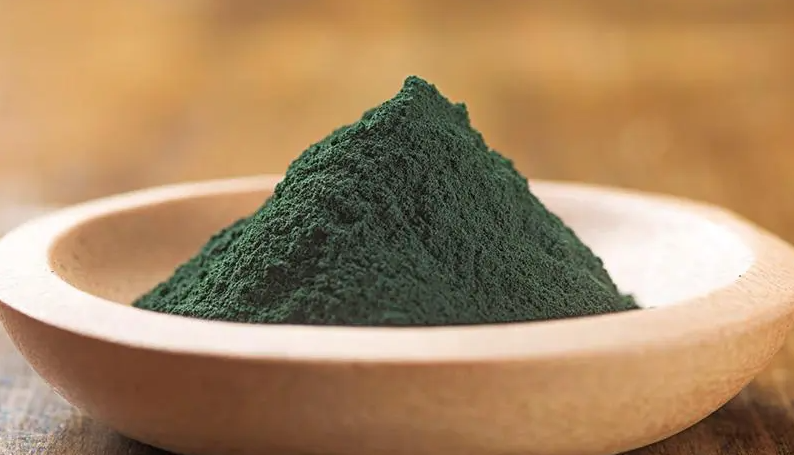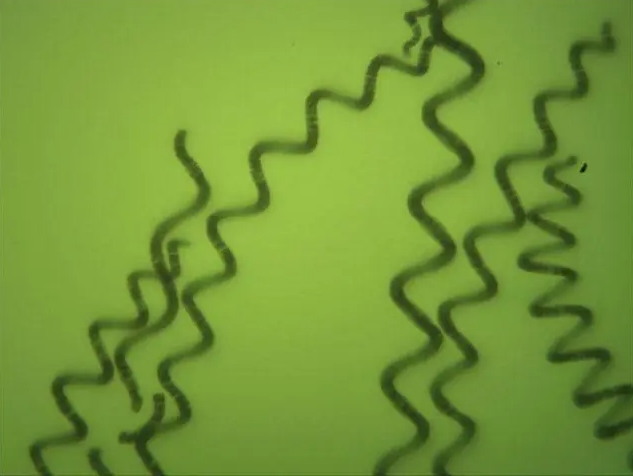
What’s the spirulina ?
Spirulina, a kind of economic microalgae, prokaryotes of Spirulina family. Algal filaments consist of single row cells, which are usually blue-green in color. Algal filaments have a regular spiral coiled structure, and the whole body can be cylindrical, spindle or dumbbell. The two ends of the algal filament are slightly thin, and the terminal cells are blunt or have a cap structure; Usually unsheathed, occasionally with a thin transparent sheath; The cells were cylindrical; There was obvious transverse septum between cells with no or no obvious constriction in the septum. Spirulina under the microscope shape is spiral, so the name spirulina.

Spirulina is distributed in saline-alkali lakes with sufficient light and suitable temperature. It was first found in Lake Chad in Africa and is also distributed in Ordos saline-alkali Lake in China. Spirulina likes high temperature and is resistant to salt and alkali; It mainly relies on simple cell division to proliferate, without sexual reproduction, and can be adapted to mariculture after domestication.
Spirulina has a high protein content, containing a special pigment protein - phycocyanin, turnip and vitamins, containing a large number of essential elements and trace elements for the human body. Human consumption of spirulina has a long history. Commercial aquaculture is mainly used for the production of health products, production of high-grade aquatic feed, extraction of phycocyanin and so on
S.platensis, S. maxima and S. subsalsa, which are commonly used in large-scale production at home and abroad, are a kind of ancient and low prokaryotic aquatic algae.
What is the chemical composition of spirulina ?
The chemical composition of spirulina has the characteristics of high protein, low fat and low sugar, and contains a variety of vitamins and trace elements, and the nutritional value is very high.
The protein content of spirulina is as high as 60%-70%, which is twice that of soybeans, 3.5 times that of beef, and 4 times that of eggs, and it contains a complete range of essential amino acids and reasonable composition.
The fat content of spirulina is generally 5%-6% of the dry weight, of which 70%-80% is unsaturated fatty acid (UFA), especially the content of linolenic acid is up to 500 times that of human milk.
The cellulose content of spirulina is 2%-4%, and the cell wall is mainly composed of collagen and hemicellulose, and the absorption rate of the human body is as high as 95%.
Spirulina vitamin and mineral content is also extremely rich, the former including vitamins B1, B2, B6, B12, E and K; The latter includes zinc, iron, potassium, calcium, magnesium, phosphorus, selenium, iodine and other trace elements, the proportion of biological zinc and iron of spirulina is basically consistent with the physiological needs of the human body, and is most easily absorbed by the human body.
In addition, phycocyanin (CPC), algal polysaccharide (PSP), gamma-linolenic acid methyl ester (GLAME), beta-carotene, chlorophyll a and other active components in spirulina have regulatory effects on many animal functions
What are the benefits of spirulina and what does it do to the body ?
Spirulina is known for its numerous health benefits. Some of the benefits of spirulina include:
1. Rich in nutrients: Spirulina is a highly nutritious food, containing a variety of vitamins, minerals, and proteins, making it a valuable dietary supplement.
2. Antioxidant properties: Spirulina contains antioxidants that help protect the body from oxidative stress and damage caused by free radicals.
3. Anti-inflammatory effects: Spirulina has been shown to have anti-inflammatory properties, which may help reduce inflammation in the body.
4. Potential cholesterol-lowering effects: Some studies suggest that spirulina may help lower "bad" LDL cholesterol levels while increasing "good" HDL cholesterol levels.
5. Support for the immune system: Spirulina may help support the immune system due to its high content of vitamins, minerals, and other beneficial compounds.
6.Potential anti-cancer properties: Some research indicates that spirulina may have anti-cancer properties, although more studies are needed to confirm this effect.
Does spirulina have side effects ?
Spirulina is generally considered safe for most people when taken in appropriate doses. However, some individuals may experience mild side effects, especially when starting to take spirulina. These potential side effects can include:
1. Gastrointestinal issues: Some people may experience digestive discomfort, such as nausea, diarrhea, or stomach pain, when first taking spirulina. Starting with a lower dosage and gradually increasing it may help minimize these effects.
2. Allergic reactions: Individuals with known allergies to seafood or seaweed may be at risk of allergic reactions to spirulina. If you have a history of such allergies, it's important to use spirulina with caution and seek medical advice if needed.
3. Interactions with medications: Spirulina may interact with certain medications, such as immunosuppressants or blood thinners. If you are taking any medications, it's important to consult with a healthcare professional before using spirulina to avoid potential interactions.
It's important to note that these side effects are not common and may vary from person to person. If you experience any adverse effects after taking spirulina, it's advisable to discontinue use and consult with a healthcare provider. As with any supplement, it's essential to use spirulina responsibly and seek professional guidance, especially if you have underlying health conditions or are taking medications.
Who should not take spirulina ?
Spirulina is generally considered safe for most people when consumed in appropriate amounts. However, there are certain groups of individuals who should exercise caution or avoid taking spirulina:
1. People with autoimmune conditions: Spirulina may stimulate the immune system, so individuals with autoimmune diseases such as rheumatoid arthritis, lupus, or multiple sclerosis should consult a healthcare professional before using spirulina.
2. Those with phenylketonuria (PKU): Spirulina contains phenylalanine, so individuals with PKU, a genetic disorder that affects the body's ability to process phenylalanine, should avoid spirulina or use it under medical supervision.
3. Pregnant and breastfeeding women: While spirulina is generally considered safe, pregnant and breastfeeding women should consult a healthcare provider before using it to ensure its safety during these critical periods.
4. People with allergies: Individuals with known allergies to seafood or seaweed should be cautious when using spirulina, as it may cause allergic reactions in some cases.
As with any supplement, it's important to consult with a healthcare professional before using spirulina, especially if you have underlying health conditions or are taking medications.
Is it safe to take spirulina every day ?
In general, spirulina is considered safe for most people when taken in appropriate doses. Many people take spirulina daily as a dietary supplement without experiencing adverse effects. However, as with any supplement, it's important to follow recommended dosages and consider individual health conditions and potential interactions with medications.
If you are considering taking spirulina daily, it's advisable to consult with a healthcare professional, especially if you have any underlying health concerns or are taking medications. They can provide personalized guidance based on your specific health status and help ensure that spirulina is safe and appropriate for your individual needs.
The appropriate daily dosage of spirulina can vary depending on factors such as age, overall health, and individual needs. However, a common recommended dosage for spirulina is around 1-3 grams per day for adults. It's important to follow the dosage instructions provided on the product label or to consult with a healthcare professional to determine the right amount for your specific circumstances.
As with any supplement, it's important to start with a lower dosage and gradually increase it while monitoring for any potential adverse effects. Additionally, individuals with specific health conditions or those who are pregnant, breastfeeding, or taking medications should seek guidance from a healthcare provider to determine the appropriate daily dosage of spirulina.
Is spirulina safe for kidneys ?
Spirulina is generally considered safe for the kidneys. In fact, some research suggests that spirulina may have potential benefits for kidney health. However, as with any supplement, it's important for individuals with kidney disease or impaired kidney function to consult with a healthcare professional before using spirulina. This is especially important if you have existing kidney issues or are undergoing treatment for kidney-related conditions. Consulting with a healthcare provider can help ensure that spirulina is safe and appropriate for your individual health circumstances.
Is spirulina from China safe?
The safety of spirulina, or any other product, depends on the specific manufacturer and their adherence to quality and safety standards. Spirulina produced in China, or any other country, can be safe if it is sourced from reputable and trustworthy manufacturers who follow strict quality control measures.
When considering spirulina from China or any other source, it's important to look for products that have been tested for purity, quality, and potential contaminants. This can include checking for certifications from regulatory bodies and independent testing for heavy metals, microorganisms, and other potential impurities.
What are the other applications of spirulina?
For medical research
The content of fatty acids in spirulina is low, of which the unsaturated fatty acids which are very beneficial to the human body account for a large proportion. Spirulina is rich in a variety of bioactive ingredients, such as beta-carotene, phycobilin, gamma-linolenic acid and endogenous enzymes, which are very beneficial to human health.
Used as feed additive
Because of its rich protein and amino acids, and rich in a variety of trace elements, spirulina has been widely used as a feed additive in animal feed, some researchers have reported the application of this new green feed additive in aquaculture and livestock production. The results showed that adding 4% spirulina - okra powder could improve the growth performance of Penaeus albinus. It has been reported that spirulina can improve the performance of piglets.
For bioenergy
As early as the 1970s, due to the occurrence of the oil crisis, the concern for clean, pollution-free and renewable bioenergy has become a hot spot, especially the preparation of biohydrogen energy. Many countries have invested a lot of manpower and material resources in the research of biological hydrogen production technology, and have accumulated a lot of research results. It has been found that compared with other biological hydrogen producing materials, spirulina has the characteristics of high photosynthetic efficiency, fast growth and reproduction, high hydrogenase activity, and long continuous dehydrogenation time, which is one of the ideal materials for the study of biological dehydrogenation. [1]
For environmental protection
In the process of growth and reproduction, spirulina needs to absorb and consume nutrients such as nitrogen and phosphorus in the water environment and degrade organic matter in the water, and has the characteristics of fast growth and reproduction, high light efficiency and strong adaptability. These characteristics of spirulina suggest that using wastewater to cultivate spirulina, on the one hand, can purify water and reduce the degree of eutrophication of water; On the other hand, high value-added spirulina products can also be obtained. Therefore, the application of spirulina in wastewater treatment is a good biological pollution control measure.

Post time: Sep-05-2024





